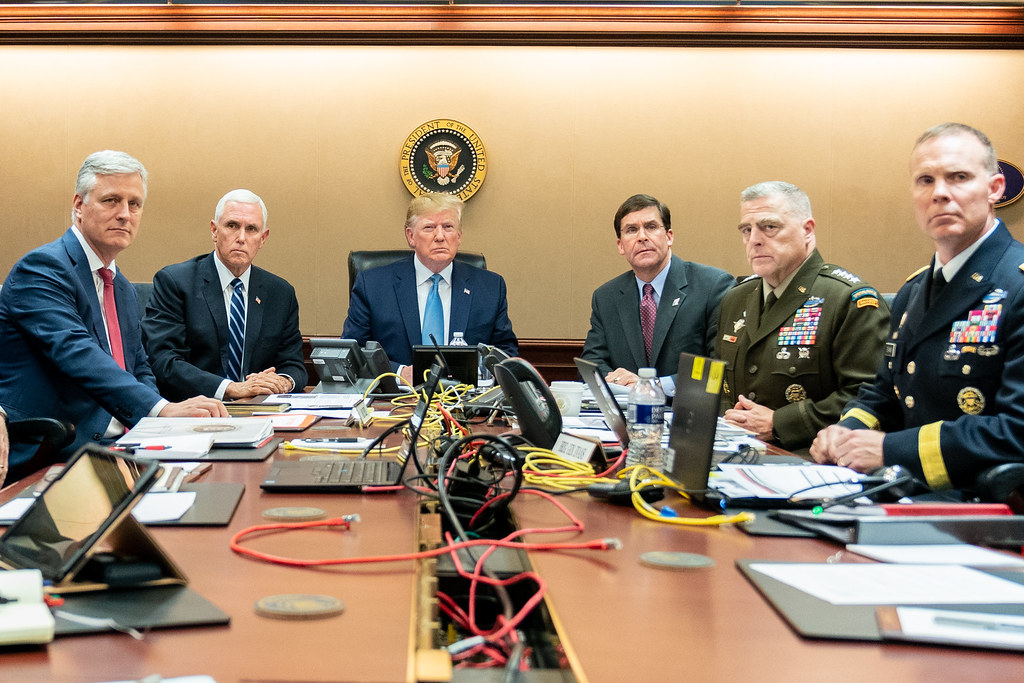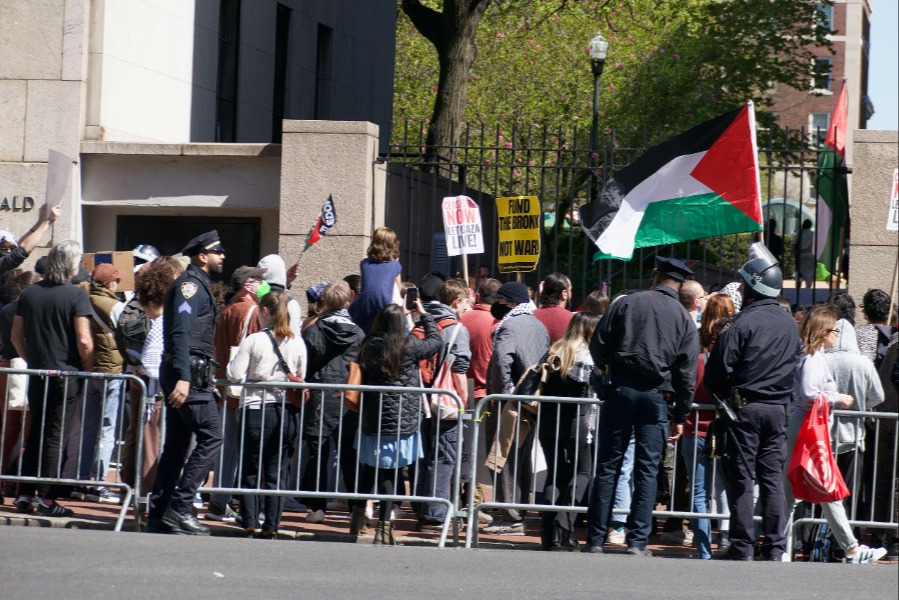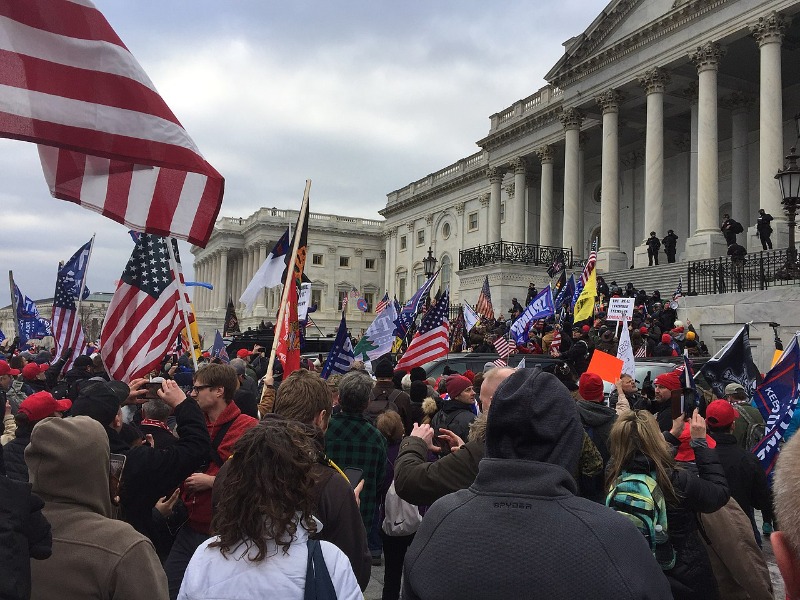Targeting al-Baghdadi and Selective Notification to Congress: Assessing the Issues
In the aftermath of the successful operation against Abu Bakr al-Baghdadi, the fact that the Trump administration gave advance notice to the Russian government and possibly also to some Republican lawmakers—but not to Speaker of the House Nancy Pelosi, House Permanent Select Committee on Intelligence Chairman Adam Schiff or other Democratic lawmakers—is attracting criticism. Is the criticism warranted? Not from a legal perspective. But it’s complicated from there.

Published by The Lawfare Institute
in Cooperation With

In the aftermath of the successful operation against Abu Bakr al-Baghdadi, the fact that the Trump administration gave advance notice to the Russian government and possibly also to some Republican lawmakers—but not to Speaker of the House Nancy Pelosi, House Permanent Select Committee on Intelligence Chairman Adam Schiff or other Democratic lawmakers—is attracting criticism. Is the criticism warranted? Not from a legal perspective. But it’s complicated from there.
Let’s have a closer look at the criticism. Here’s a good example, from CNN:
President Trump admitted on Sunday the White House did not inform some key Democrats about the daring raid that resulted in the death of ISIS leader Abu Bakr al-Baghdadi.
The move to not make notable leaders aware goes against the usual traditional for such high-profile operations. The bipartisan praise for the US mission was undercut by criticism that the Trump administration did not inform congressional leaders about it ahead of time and came amid broader concerns about the strategy in the region after the US removed troops from Syria.
After saluting the “heroism, dedication and skill of our military and our intelligence professionals,” House Speaker Nancy Pelosi said that the “Russians but not top Congressional leaders were notified of the raid in advance.”
And there is, too, this report from FOX’s Chad Pergram indicating that the president, in contrast, did give at least some form of notice to unspecified Republican lawmakers.
Let’s assume this account of how notifications were handled is accurate. Did any of this violate the law? The answer is no, as I will explain below. Was any aspect of it at least unwise or otherwise undesirable as a matter of policy even if legal? That’s trickier.
I. Was the White House required by law to give advance notice to anyone in Congress?
This issue does not arise in a vacuum. The question of whether, when and how notification (advance or otherwise) to Congress must occur has been the subject of serious attention for decades. This has resulted over time in a detailed statutory framework providing the ground rules, and it seems that the Trump administration acted consistent with that framework in this case.
Here is how the analysis works, in a nutshell:
Question 1: Was this a Title 50 “covert action”?
This question matters because a complex set of congressional notification requirements come into play if the answer is yes, not to mention some tricky constitutional questions regarding whether and when the president can decline to comply. But the better answer appears to be no, meaning that those requirements do not apply in the first place.
The Deniability Issue
Start with the affirmative definition of “covert action.” According to 50 U.S.C 3093(e), the phrase “covert action” refers to “an activity … of the United States Government to influence political, economic, or military conditions abroad, where it is intended that the role of the United States Government will not be apparent or acknowledged publicly[.]” In this case, we plainly have an activity of the U.S. government intended to influence both political and military conditions abroad, so the first part of the definition is satisfied. But the public record thus far offers no basis to believe that the second necessary element of the definition—i.e., deniability—also was met.
To be sure, the fact that the administration went public about the raid after the fact does not foreclose the possibility that the administration ex ante wanted the option of deniability (in case, for example, things went catastrophically wrong) and thus that it was a Title 50 covert action at the time it was carried out. Indeed, we’ve seen a conspicuously similar operation unfold in exactly that way: Operation Neptune’s Spear (the raid that killed Osama bin Laden). But whereas the incursion into Pakistan to get bin Laden was the sort of exceedingly sensitive border crossing that might warrant the veil of deniability, this weekend’s operation in Syria (where we have been conducting overt military operations for a long time) just does not fit that bill; we have no reason to be worried about sensitivities in Damascus in connection with this raid. Simply put, it’s hard to see why it would have been appealing to seek deniability in this instance. (And please note: Deniability is entirely distinct from detectability; there is no doubt the operation was intended not to be detected while in progress.)
The Traditional Military Activities Issue
Now, let’s say it is otherwise. That is, let’s say the administration wanted the deniability option. Wouldn’t this then be a “covert action”? Probably not, because the statute goes on to carve out various exceptions in which deniability operations still don’t count as covert action—and one of those exceptions is “traditional … military activities” (TMA). See 50 U.S.C. 3093(e)(2).
There has been a lot of debate over time regarding the metes-and-bounds of the TMA exception, particularly in circumstances that involve either novel technologies (such as computer network operations) or circumstances remote from traditional battlefields. But the al-Baghdadi raid is neither of those. We are told it was a Delta Force raid conducted in-theater, against the military commander of an enemy organization against which the U.S. has been using overt force for years. So long as the operation was commanded and conducted by military personnel, it should count as TMA even if the option of deniability was in place.
At this point, you might be recalling that the bin Laden raid was described publicly, after the fact, as a Title 50 covert action rather than as TMA, despite being orchestrated and conducted by U.S. Navy SEALS. In that case, however, the administration chose to frame the operation as having been directed, overall, by the CIA director. This could turn out to be the case now as well, but that seems unlikely. The early reporting does mention a CIA role of the intelligence-collection/manhunting variety, but so far there is no hint that Delta Force here had been effectively seconded to operate under CIA direction.
The Memorandum of Notification Issue
What if this too is wrong? There remains a further complication to address before one can lodge criticism on nonnotification grounds. It seems exceedingly likely to me (although I have no direct or indirect knowledge whatsoever) that there is in fact a current covert-action finding in place with respect to the Islamic State and its key leaders, that it has long since been notified to Congress consistent with Title 50 rules, and that it includes lethal force options. Of course, that guess could be wrong. But I’d be very surprised if it were not the case. And if it is the case, then the only notification-related issue raised by the al-Baghdadi raid would be whether there was a separate statutory obligation to keep the intelligence committees “fully and currently informed” about these operations. See 50 U.S.C. 3093(b)(1). Put simply then, the question becomes whether the decision to undertake this specific raid required submission of a “memorandum of notification” (MON) describing the plan. The covert action statutory scheme does not really speak to such nuances regarding “updates,” however, and declassified documents detailing the triggers for generating MONs suggest a focus on strategic change rather than some granular obligation to generate them on a per-operation basis.
Bottom line? This probably was a Title 10 rather than a Title 50 operation, either because it was not meant to be deniable in the first place or because it was TMA even if deniable. But even if it were otherwise, it’s far from clear that an operation-specific notification was required in this instance.
Question 2: Are there notification requirements for military operations intended to capture or kill particular persons?
Longtime Lawfare readers will recall that Congress in the post-9/11 period has gradually developed a parallel notification structure for certain targeted military strikes, precisely because the TMA exception means that the covert-action oversight system won’t apply. I’ve written about this as the building blocks have emerged over the years (see here for an example in 2016). The relevant statute is 10 U.S.C. 130f. In a nutshell, it requires that the secretary of defense (instead of the president) provide a “notice in writing” (instead of a “finding”) to the Senate and House Armed Services Committees (instead of the intelligence committees) where the military conducts a “lethal operation or capture operation … that targets a specific individual or individuals” and where the operation occurs any place other than “Afghanistan, Syria, or Iraq.”
Why exclude from this oversight system targeted kill-capture operations that happen in Afghanistan, Syria or Iraq? Because those are (and have been) the locations of sustained overt military operations for many years, where targeted kill-capture operations are the order of the day rather than an unusual occurrence with potential to pull the United States into a new conflict. Simply put: Congress crafted this mechanism with an eye toward non-combat-zone contexts and intended to spare the Pentagon from such tailored reporting obligations when conducting “regular” military activities inside a theater of hostilities.
At any rate, the Syria exception, obviously, applies here.
But what if it didn’t? Well, the statute requires reporting to the Armed Services Committees, not to the Speaker of the House or to the House Permanent Select Committee on Intelligence. And it gives the defense secretary 48 hours to provide the notice in any event.
Bottom line? Congress has spilled a lot of ink since the 1970s constructing notification rules, attempting to strike a balance between the legitimate needs of tactical, operational and strategic secrecy and the imperative of ensuring proper oversight in a free and open society governed by the rule of law. In the course of doing so, it has drawn careful lines, including with specific reference to targeted kill-capture operations conducted by the military inside areas of active combat operations. Not giving advance notice to the speaker or the House intelligence chairman appears perfectly consistent with these rules.
II. Was it improper to give notice to the Russians but not the Democrats?
Speaker Pelosi in particular has drawn attention to the fact that the Russians were given advance notice, whereas congressional leaders were not. But so long as the congressional leaders were not actually entitled to such notice (as I argue above), the comparison makes no sense. The Russian military is present and operating on a large scale in Syria, including significant air assets and capacities for monitoring what is occurring in Syrian airspace. So long as “notification to the Russians” was a matter of ensuring the safety of the Special Operations Forces personnel transiting to the site of the raid, this should not be the subject of criticism. Indeed, it’s important not to “cry wolf” in relation to Russia in this setting, lest the apparent lack of merit for the criticism be taken by some as reason to doubt concerns that arise about contacts with or favoritism toward the Russians in other settings.
III. Was it improper to give notice to some Republican lawmakers but not Democratic ones?
This issue, in contrast, deserves attention. I will withhold full judgment pending further information and for now will simply address the hypothetical toward which the early reporting gestures: that is, the possibility that the president decided to give advance warning to a few legislators but made a point of doing so on a partisan basis.
At a high level of generality, I see at least two distinct issues here. First, and most seriously, we should consider whether this was an instance of seeking partisan advantage through selective sharing of information. If so, that would be deeply problematic. Given the context, however, I cannot see where some partisan advantage may have been obtained.
More likely, the situation implicates a second concern: the specter of what we might call partisan “identification” in relation to military or intelligence activity—that is, injecting a sense of relevance for party affiliation in the context of military or intelligence activities. This too is undesirable, even if it is less alarming than outright efforts to procure partisan advantage. It is corrosive of the trust that we should want to have in the nonpolitical nature of military and intelligence activities and institutions. It is an amorphous concern and not one that is easy to police (especially in the context of oversight-related matters). That said, there’s little doubt that choosing to share information of this kind on an obviously partisan basis is, at best, unhelpful. If it proves to be true, then, it is a fair ground for criticism.





